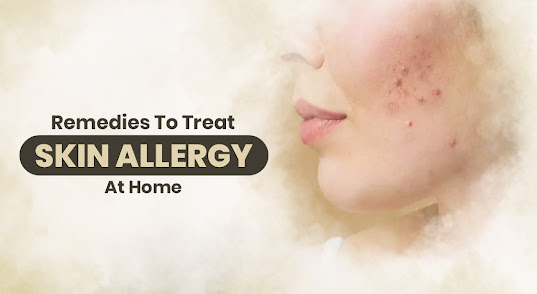That red, swollen area on your skin—do you wonder what it might
be? It can be a skin allergy. They are indicators of several medical problems.
Generally, they occur when our immune system reacts to any particular substance
that can be harmful for our body.
When
certain foreign substances that you might be allergic to come into contact with
your skin, it leads to the formation of a skin rash. Itchy skin can be really
frustrating and painful, right? Let’s remedy skin allergies at home using
essential oils, fenugreek seeds, and aloe vera gel.
The
National Eczema Association (NEA) states that those who frequently have itchy
skin may have trouble falling asleep and may even experience depression or
anxiety. Additionally, they could scrape their skin, leading to tiny tears that
are prone to infection.
Insect bites, allergies, stress, and
skin diseases including eczema and psoriasis are some of the common causes of
itchy skin.
Some of the most effective home
treatments for itching are described in this article.
1.
Aloe Vera
Aloe
vera aids in the treatment of skin allergies. Aloe vera contains
anti-inflammatory and cooling effects. On the allergy-affected areas, you can
apply aloe vera gel. Aloe vera gel aids in providing comfort for itching
brought on by allergies. Aloe vera can therefore be used topically to treat
skin allergies. Talk to Dermatologist Near Me
to understand the right treatment for skin allergies in one click.
2.
Coconut oil
Helps in softening the skin, reducing dryness, and
removing flakiness. Coconut oil helps the skin heal by reducing irritation. Medium-chain
fatty acids, vitamin E, and vitamin K are essential components of coconut oil
that permeate the skin to moisturise and treat skin issues. It can be used
straight up or combined with olive oil in equal amounts. Oil should be applied
to the skin gently and left on for at least 30 minutes. If you have sensitive
skin, applying coconut oil after a bath keeps your skin soft and problem-free.
A study found that using coconut oil helped people with eczema and atopic
dermatitis.
3.
Honey
If you don’t already know that honey
is an all-round remedy for problems, then sit back and learn how this one
ingredient will treat your skin back to health. In numerous cultures all over
the world, it has been used as a therapeutic technique to induce quick tissue
healing, promote the formation of new skin, and inhibit bacterial growth. A
study found that eight out of ten participants who applied honey experienced a
significant improvement in the lesions brought on by their allergies.
Honey can be simply applied to the skin two to
three times each day. Before rinsing it off with lukewarm water, wait at least
30 minutes. You can also apply a mixture of one-part cinnamon powder and one-part
honey. To relieve skin allergies, combine lukewarm water with one tablespoon
each of lime juice and honey.
4.
Baking Soda
It
is believed that baking soda can help treat skin allergies. Make a paste out of
the baking soda and water by mixing them together. Apply this paste to the
places where the skin allergy is present. Wash it with cold water after five to
ten minutes. As well as minimising skin rashes and offering relief from
itching, it also works to stop skin inflammation.
5.
Wet Cloth Therapy
Wet wrap therapy (WWT)
involves wrapping irritated skin in gauze or surgical netting that has been
soaked in water.
These
wraps provide a physical barrier that prevents scratching while rehydrating and
soothing the skin. Children may benefit most from this treatment. Additionally,
WWT may facilitate the skin's absorption of drugs like topical steroids. Apply
drugs to the region with a light hand before putting on the wraps, and then
generously cover the area with moisturiser.
The steps listed below
are recommended by the NEA for applying wet wraps:
·
Warm water should be used to dampen a
piece of gauze until it is moist.
·
Wrap a piece of gauze across the skin
area that itches.
·
Cover the damp piece of gauze with a
piece of dry gauze.
6.
Cold Showers
A cold bath can lessen
allergies and skin rashes. A cold shower causes your blood vessels to constrict
and prevents histamine from escaping. Additionally, it lessens the severity and
skin rashes caused by the allergic reaction.
When to see a doctor?
If
you have any of the following symptoms, you should get in touch with your doctor:
·
If treatment for a skin allergy or
rash doesn't resolve it in a week,
·
If the skin allergy or rash returns
after disappearing for a while,
·
If the rashes hurt or itch a lot, or
if you notice blisters on your skin.
If the rash exhibits signs of infection (redness, swelling, or warmth), you should seek Best Skin Doctor in Jaipur rather than relying solely on home remedies to treat the disease.
Conclusion
It can be a rash if you notice a red region that is accompanied by pain and swelling. An inflammatory response to allergens (substances that induce allergy) is the principal cause of skin rashes. Therefore, you must first determine the cause in order to properly treat it. The rash might not go away right away, even after all of this. You can try natural treatments for skin allergies, including aloe vera gel, oak bark, flaxseeds, and German chamomile. However, you should speak with your Skin Specialist in Jaipur and seek their medical assistance on Health Gennie, an online doctor consultation app where you can find doctors online if the rash worsens and doesn't go away or if you experience the symptoms of infection (redness, swelling, and heat).





No comments:
Post a Comment